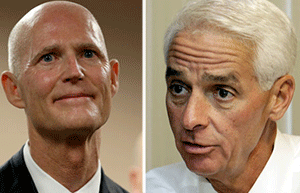Before Tuesday ends, South Floridians will know if Gov. Rick Scott gets a second term or if his challenger, Charlie Crist, reclaims the state’s top elected post, along with the outcome of several other important ballot measures.
To determine where the region’s real estate industry stands, The Real Deal analyzed campaign finance reports for both the gubernatorial and Miami-Dade Property Appraiser races, as well as two ballot questions that could lead to the construction of a new civil courthouse in Miami and the expansion of Florida International University’s south campus.
In the governor’s race, Republican Scott holds considerably more clout among real estate professionals than Republican-turned-Independent-turned-Democrat Crist, who was governor from 2007 to 2011. According to campaign finance reports obtained from the state’s Division of Elections, Scott has collected 769 contributions that are identified as coming from real estate professionals or companies compared to Crist’s 267 donations from the same category.
Big names in South Florida’s real estate community that donated to Scott include Genting Group, the Malaysian resort company redeveloping the former Miami Herald headquarters in downtown Miami ($6,000); Codina-Carr Residential, a partnership between developers Armando Codina and James Carr ($24,000); and Pan American Companies, a real estate development firm owned by the father of Scott running mate and Lt. Gov. Carlos Lopez-Cantera ($24,000).
Crist’s finance report of those who self-identified as being part of the real estate industry only includes two high-profile players: Related Group CEO Jorge Perez and Robert Wennett, developer of 1111 Lincoln Road. They each kicked in $3,000 for Crist’s campaign. That’s the limit under Florida law for contributions to candidates for statewide office from individuals and corporations, as opposed to political committees. Individuals and corporations can make additional donations through affiliates, subsidiaries and other related entities.
Bob Jarvis, a Nova Southeastern University ethics law professor, told TRD real estate special interests are leaning more toward Scott because he has demonstrated that he is pro-business during his first four years in office.
“Real estate developers have a tremendous interest in the candidate who will push their projects forward,” Jarvis said. “Scott is definitely the more anti-regulation candidate.”
Additionally, Crist is not getting the same level of industry support because many business owners don’t trust him after switching of political parties multiple times, according to Jarvis.
“He doesn’t get the support from true Democrats because a lot of people don’t believe he is really a Democrat,” he said.
The Orlando-based Realtors Political Action Committee collected $3.9 million in contributions, according to the state’s Division of Elections. Funds collected by RPAC get distributed between national, statewide and local industry associations to support “pro-Realtor” candidates, according to its website. Under federal law, individual donors to RPAC cannot earmark their contributions to specific parties or candidates.
In Miami-Dade, the runoff for property appraiser between Pedro Garcia, the candidate who held the post from 2009 to 2012, and former state Rep. Eddy Gonzalez has received minimal attention from real estate bigwigs. Garcia, who has raised $196,695, got $22,000 and $17,000 in contributions from Adrian Homes, a company owned by a group of prominent single-family homebuilders, and developer Sergio Pino, respectively. Florida East Coast Industries and Miami Beach developer Russell Galbut donated $10,000 and $5,500, respectively, to Gonzalez, who has a $418,455 war chest.
The real estate industry also doesn’t seem too concerned about building a new courthouse, where foreclosure cases and real estate lawsuits would be addressed. Local judges and lawyers have collected more than $1 million for ads asking voters to approve a $400 million general obligation bond to build a new courthouse and renovate the existing one at 73 West Flagler Street, a building that is in disrepair. According to the campaign finance report for pro-courthouse political action committee Building Blocks for Justice, all of its contributions have come from lawyers, law firms and legal professionals.
However, several prominent Miami builders support expanding FIU’s footprint into the Miami-Dade County Youth Fair property next door to the south campus. Friends of Higher Education, the PAC that has collected $1.5 million overall, received $10,000 from Galbut, $25,000 from Perez and Related Cos. chairman and Miami Dolphins owner Stephen Ross and $50,000 from former U.S. ambassador Paul Cejas, a major property owner on Lincoln Road in Miami Beach.
“With FIU, builders see an opportunity for future business,” Jarvis said. “They want to see the expansion take place.”
